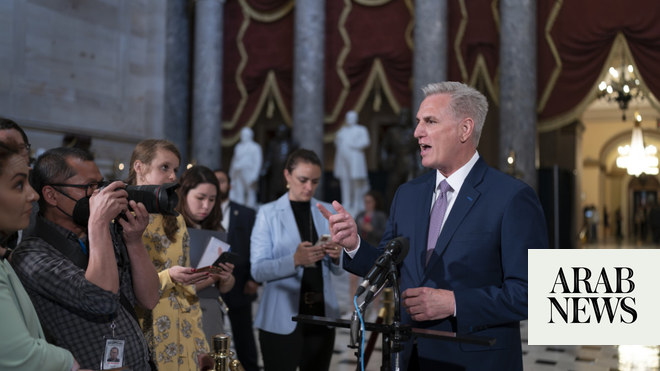
After Iraqi politicians threw a wrench into their state, putting self before country, the trip of President Joe Biden to Saudi Arabia offers Iraqis a chance to make things right. And by the same token it offers America the opportunity to reconnect with Iraqi allies, without whom containing Iran might prove arduous.
Iraq was once the top priority of the world’s only superpower. At the US State Department, more than 100 diplomats worked at the “Iraq desk.” But as Iraq fatigue set in, the number dwindled to only a handful.
America’s nonchalance toward the strategically important Iraq is unjustifiable. The country is one of the planet’s biggest oil producers, at a time the world is desperately seeking alternatives to Russian energy supplies before winter.
Iraq can also play an instrumental role in deterring what the White House calls Iran’s threats in the region.
Facing suffocating US sanctions on its economy, Tehran has leeched off Iraqis, siphoning billions of dollars that Baghdad collects from oil revenue. In 2021, the Iraqi treasury raked in $75 billion, yet the country’s central bank was barely able to defend its local currency against depreciation. Through small exchange shops, Tehran has managed to withdraw billions in foreign currency auctioned by the Iraqi central bank to defend the dinar.
Iran has also forced the Iraqi government to bankroll pro-Tehran militias — Iraqi, Lebanese, Syrian and Afghan — that fight Iran’s wars throughout the region. When the Iranian regime wanted to shore up Hezbollah’s fortunes because of Lebanon’s free-falling economy, Tehran instructed Baghdad to supply Beirut with oil shipments that have kept the lights on in Lebanon, albeit for only an hour a day.
For America to behave as if Iraq is a hornets’ nest that is best left untouched is to pretend that Washington can build a Middle East alliance to contain Iran without recruiting allies in Iraq.
So far, Washington has done a terrible job in keeping its Iraqi friends. When former President Barack Obama took office in 2009, he threw the Sunni Sahwat forces under the bus, allowing former Prime Minister Nouri Al-Maliki, a Shiite, to go after them, thus contributing to the rise of Daesh.
Since the war on Daesh, the Obama team — now back in office with Biden — has let down the Kurdistan Democratic Party, which has proven to be the most reliable American ally over the past few decades. Iraq’s Kurds played a major role in checking Daesh’s expansion during the militia’s early weeks and before Washington could scramble enough forces to roll back the terrorist group.
As Washington shed its Iraqi allies and made nice with Tehran, for fear that pressure might obstruct the already-stalled nuclear talks, anti-Iran forces in Iraq laid low.
The US president can make it known that America is back in the region and that its comeback includes boosting allies in Iraq.
Hussain Abdul-Hussain
Thankfully, however, America’s allies — mainly Saudi Arabia and the UAE — have not given up on the Iraqis. By inviting Iraq’s acting Prime Minister Mustafa Al-Kadhimi to attend the GCC+3 summit with Biden in Jeddah on Saturday, Riyadh has offered America another chance to reconnect with Iraqis.
Should Biden grasp this opportunity and hold a bilateral meeting with Al-Kadhimi on the sidelines of the Jeddah summit, the US president should let the Iraqi premier know that America is still invested in Iraq and that it will support its every effort to regain sovereignty by disbanding the pro-Iran militias.
Biden might also want to tell Al-Kadhimi that the world is watching and that imbecile laws, such as the one criminalizing nonexistent normalization with Israel, have no place in the world of adults and in a region that is inching closer to peace and regional integration in defense and economy.
The US president should also let his Iraqi counterpart and the world know that America is serious about facilitating energy production to alleviate global shortages and mitigate inflation. This includes leaning on Al-Kadhimi to end Baghdad’s bullying of Iraqi Kurdistan and to let it pump gas to Turkey and Iraq.
He can also tell his Iraqi interlocutor that, if the Iraqi government does not supply the Kurdish national guard, the Peshmerga, with adequate weapons, Washington will do so.
An acting Iraqi premier without a parliamentary bloc behind him might not be able to cut Biden any promises. But the US president can use the occasion to make it known that America is back in the region and that its comeback includes boosting allies in Iraq and helping them push back against Iran’s bullying.
Renewed American interest in Iraq should not derail the nuclear talks with Iran. If Tehran thinks it does, then the regime should be welcome to expand negotiations to include — in addition to its nuclear ambitions — its militias and its ballistic missiles, a conversation that Iran has long refused to have.
• Hussain Abdul-Hussain is a research fellow at the Foundation for Defense of Democracies, a Washington, DC-based, nonpartisan research institute focusing on national security and foreign policy. Twitter: @hahussain












